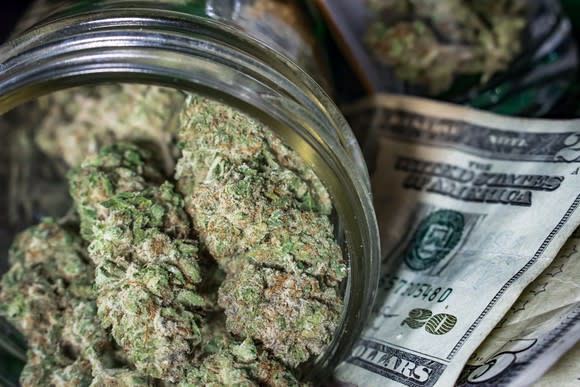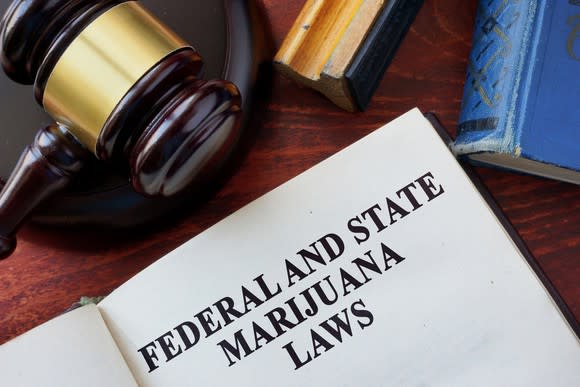The IRS Is Seeing Green on Marijuana's Dime
The cannabis industry is growing like a weed, and investors have been more than willing to jump right in with both feet.
The big news, of course, is the legalization of recreational marijuana in Canada back on Oct. 17. Becoming the first industrialized country in the world to approve adult-use pot, Canada appears to be on track to add $5 billion or more in annual sales once the industry is fully up to speed. Though it'll take a few years, there's little denying the opportunity that marijuana stocks offer investors.
However, this opportunity varies by country. In Canada, where weed is legal, it's game on for investors. But in the U.S. market, where marijuana sales could handily surpass those of every other country in the world if legal, investing is akin to placing a bet on the roulette table.

Image source: Getty Images.
The IRS is making bank off of the U.S. weed industry
In the U.S., following midterm elections, 32 states have legalized medical cannabis in some capacity. With residents of Michigan voting in favor of their statewide recreational pot proposal, there are also 10 states where adult-use cannabis is legal, albeit sales are only allowed in nine of those states (sorry, Vermonters). States like California have the potential to single-handedly outproduce and outsell all of Canada, which is why there's so much interest placed by investors in U.S. pot stocks.
Yet the federal laws are set up in such a way as to make life miserable for cannabis companies based in the States. You see, businesses that sell a Schedule I substance -- i.e., wholly illegal, prone to abuse, and not recognized as having any medical benefits -- are subject to Section 280E of the U.S. tax code, which was written and signed into law in the early 1980s to stick it to illicit drug dealers. Without digging too deeply into the weeds, Section 280E disallows businesses that sell illicit substances, as defined by the Controlled Substances Act, from taking normal corporate income tax deductions. With the exception of cost of goods sold, which is usually a small percentage of expenses, little can be done to reduce a marijuana stock's effective tax rate.
Despite marijuana being an illegal drug at the federal level, the Internal Revenue Service has no problem padding the government's coffers with taxes paid by profitable U.S.-based pot companies. In 2017, the U.S. government collected a whopping $4.7 billion in taxes despite cannabis companies reporting a little less than $13 billion in total sales, according to Quartz.

Image source: Getty Images.
Money is a big reason cannabis won't be legalized in the U.S. anytime soon
In the grand scheme of things, $4.7 billion in collected tax revenue isn't much of a needle mover when the federal government is producing annual budgets that total more than $4 trillion. But it becomes meaningful as the federal deficit climbs. In fiscal 2018 (the federal fiscal year runs from Oct. 1 to Sept. 30), the federal budget deficit of $779 billion was the highest since 2012. If marijuana were to be legalized in the U.S., it would no longer be subjected to Section 280E of the U.S. tax code, thereby reducing the amount of revenue the federal government would collect each year.
Now, I know what you're probably thinking: "Why not just legalize recreational weed and impose a federal excise tax to make up for the taxable income that would be lost from no longer being subject to 280E?" Though this sounds logical, the issue is that adding a federal excise tax would make legal marijuana that much pricier compared to black-market cannabis. Remember, the black market already benefits from not having to pay excise taxes or federal income tax, and it doesn't have to wait for cultivation licenses and sales permits. If the federal government were to impose a tax of its own following legalization, it would probably drive some consumers back to illicit channels, thereby hurting its chances of generating additional taxable revenue.
Though there is no shortage of reasons to believe the U.S. government won't legalize marijuana anytime soon, money rightfully tops this list.

Image source: Getty Images.
Investors will have to deal with the speed bumps as they come along
So what does this mean for investors who are looking to grab their piece of the fast-growing cannabis industry in the United States? Primarily, it suggests that the ride could be bumpy and that patience is a must with this still-nascent industry.
Although it's very possible for investors in U.S. marijuana stocks to lose most -- or all -- of their investment if things don't pan out, they can improve their chances of success by focusing on U.S. pot stocks that have global appeal.
One go-to U.S. cannabis stock that fits this description is KushCo Holdings (NASDAQOTH: KSHB). KushCo is a company that's probably best known for its packaging and branding solutions. It makes tamper- and child-resistant packaging for more than 5,000 cannabis companies worldwide. In doing so, it takes on the responsibility of ensuring that products remain compliant with federal, state, and/or local laws while also helping growers differentiate their products from a lot of competition.
Through its acquisition of Summit Innovations, KushCo is now also a producer of hydrocarbon gases and solvents. Hydrocarbon gases are used in the production of high-margin cannabis oils, whereas solvents are an indispensable part of the production process for cannabis concentrates. High-margin alternative products are likely to be a big focus of growers over the long run, with dried cannabis having shown its propensity to be commoditized in states like Colorado, Washington, and Oregon.
In other words, KushCo Holdings is one of potentially a handful of U.S. pot stocks that could outperform, despite the federal government being unwilling to change its tune.
More From The Motley Fool
Sean Williams has no position in any of the stocks mentioned. The Motley Fool recommends KushCo Holdings. The Motley Fool has a disclosure policy.

 Yahoo Finance
Yahoo Finance 